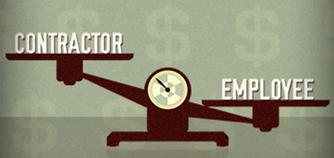
1. Consult an attorney to determine whether you are in fact misclassified. Often, whether you are properly classified as a contractor is a close call. An exeprienced employment attorney should be able to evalute your job duties and terms of your employment to give you a better idea of whether you should be classified as an employee or an independent contractor.
2. Consider your workplace culture and your relationship with the employer. What is the atmosphere like at your company? Is there a true open door policy where employee share their concerns and employers are trying to address them? Did you notice other employees being retaliated against? In other words, you should aks yourself how likely you think the employer will retaliate against you based on your observation of how they treat employees in general.
3. Can you afford taking the risk of being retaliated against? Can you afford dealing with the worst case scenario of being fired? Do you really like your job or you don't really care if you are fired and you are ready to move on anyway? Can you financially handle not working for a while regardless of whether you have a case against the employer or not?
If you decide to bring the issue of misclassification to your employer's attention, and you want to avoid being retaliated against, make sure you watch this video below for important advice on how to complain:
 RSS Feed
RSS Feed

